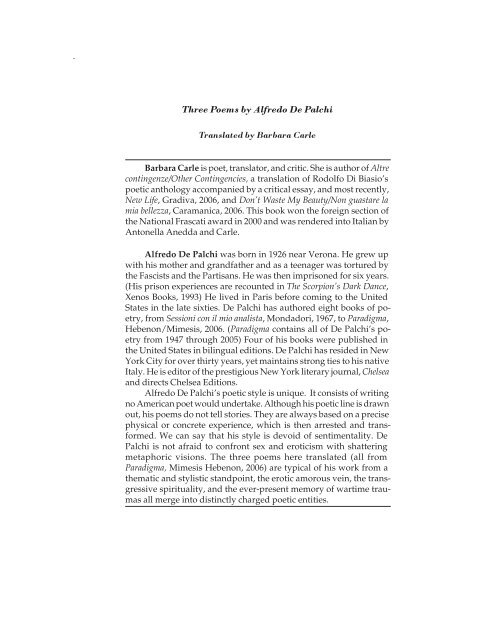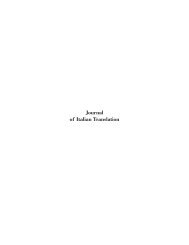Journal of Italian Translation
Journal of Italian Translation
Journal of Italian Translation
You also want an ePaper? Increase the reach of your titles
YUMPU automatically turns print PDFs into web optimized ePapers that Google loves.
Three Poems by Alfredo De Palchi<br />
Translated by Barbara Carle<br />
Barbara Carle is poet, translator, and critic. She is author <strong>of</strong> Altre<br />
contingenze/Other Contingencies, a translation <strong>of</strong> Rodolfo Di Biasio’s<br />
poetic anthology accompanied by a critical essay, and most recently,<br />
New Life, Gradiva, 2006, and Don’t Waste My Beauty/Non guastare la<br />
mia bellezza, Caramanica, 2006. This book won the foreign section <strong>of</strong><br />
the National Frascati award in 2000 and was rendered into <strong>Italian</strong> by<br />
Antonella Anedda and Carle.<br />
Alfredo De Palchi was born in 1926 near Verona. He grew up<br />
with his mother and grandfather and as a teenager was tortured by<br />
the Fascists and the Partisans. He was then imprisoned for six years.<br />
(His prison experiences are recounted in The Scorpion’s Dark Dance,<br />
Xenos Books, 1993) He lived in Paris before coming to the United<br />
States in the late sixties. De Palchi has authored eight books <strong>of</strong> poetry,<br />
from Sessioni con il mio analista, Mondadori, 1967, to Paradigma,<br />
Hebenon/Mimesis, 2006. (Paradigma contains all <strong>of</strong> De Palchi’s poetry<br />
from 1947 through 2005) Four <strong>of</strong> his books were published in<br />
the United States in bilingual editions. De Palchi has resided in New<br />
York City for over thirty years, yet maintains strong ties to his native<br />
Italy. He is editor <strong>of</strong> the prestigious New York literary journal, Chelsea<br />
and directs Chelsea Editions.<br />
Alfredo De Palchi’s poetic style is unique. It consists <strong>of</strong> writing<br />
no American poet would undertake. Although his poetic line is drawn<br />
out, his poems do not tell stories. They are always based on a precise<br />
physical or concrete experience, which is then arrested and transformed.<br />
We can say that his style is devoid <strong>of</strong> sentimentality. De<br />
Palchi is not afraid to confront sex and eroticism with shattering<br />
metaphoric visions. The three poems here translated (all from<br />
Paradigma, Mimesis Hebenon, 2006) are typical <strong>of</strong> his work from a<br />
thematic and stylistic standpoint, the erotic amorous vein, the transgressive<br />
spirituality, and the ever-present memory <strong>of</strong> wartime traumas<br />
all merge into distinctly charged poetic entities.

















